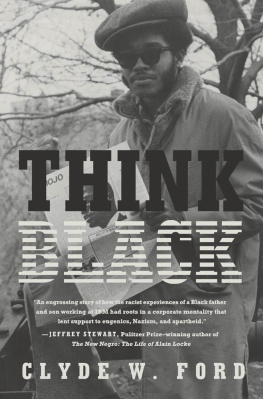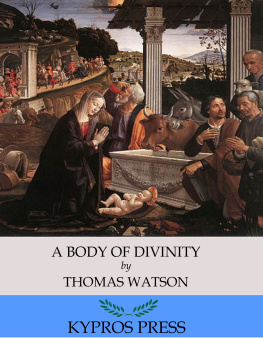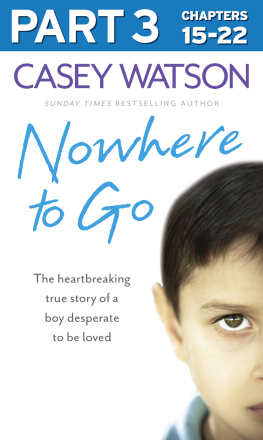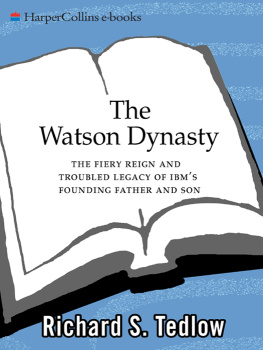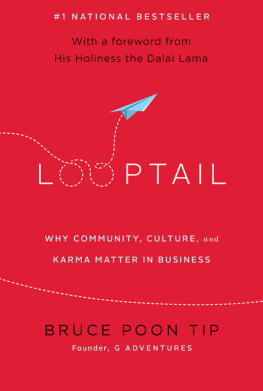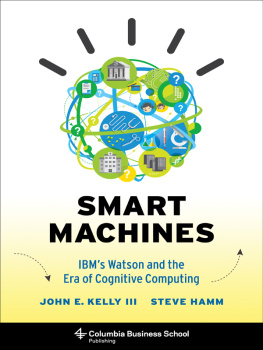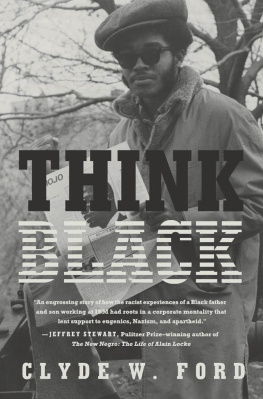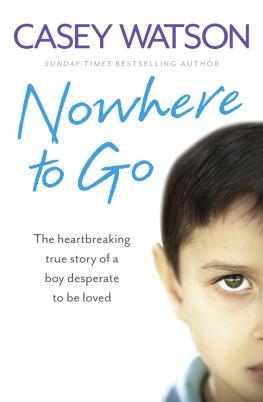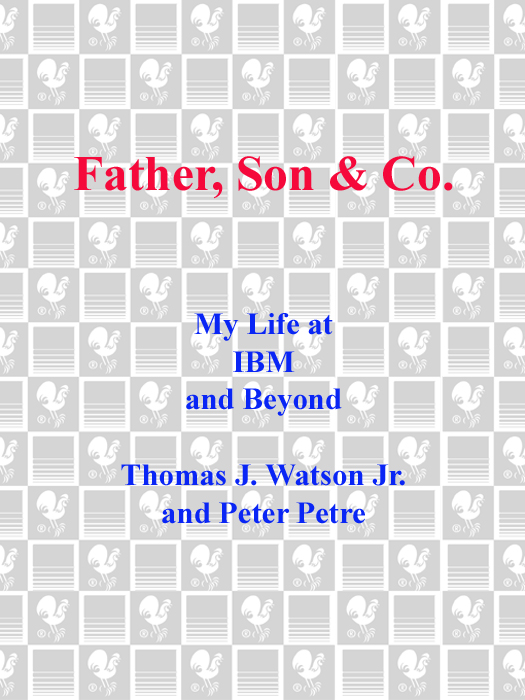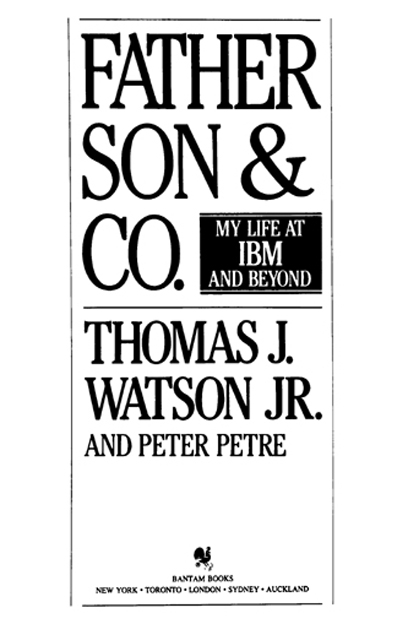INTERNATIONAL PRAISE FOR
FATHER, SON & CO.
Father, Son & Co. is an absorbing memoira candid portrait of an honest man and a famous company.
Arthur Schlesinger, Jr.
A most compelling human drama of the family that dominated the life and times of Americas most famous computer colossus.
The Economist
An extraordinary story of family success and succession.
McGeorge Bundy
Watson writes with grace and intimacy about coming to terms with his accomplished father.
New York magazine
Father, Son & Co. is a marvelously refreshing book. I believe many will profit from these honest and experienced reflections of an honest and experienced man.
Clark M. Clifford
An intensely human account of how two strong executives struggled to build a great and powerful company while simultaneously managing all of the tensions and loyalties associated with being father and son.
Derek Bok, president emeritus, Harvard University
This family drama is doubly fascinating because it is interleaved with one of the most remarkable business stories in history.
Financial Times
A welcome antidote to the daily reports of junk bonds, corporate takeovers and human greed which have come to dominate the news of American business.
Robert S. McNamara
With two sons following in our own family business, I found Father, Son & Co. riveting. It gave me great insights as well as great inspiration. I urge everyone in a family business to read it and THINK.
Stew Leonard, chairman, Worlds Largest Dairy Store
It is a lesson to youngsters as to how to get the most out of life.
Tom Cabot, former chief executive officer, The Cabot Corporation
A frank and revealing picture of Big Blue, the nations dominant computer manufacturer, and a vivid inside look at the family that dominated its years of spectacular growth.
The Boston Globe
Thomas Watsons life values are IBM values: employees as family; integrity above all else; commitment to the community; and as he says, go the last mile to do a thing right. These are values which I share, and can only hope to be as successful as Thomas Watson in furthering these values.
Akio Morita, chairman of the board, Sony Corporation
A dead-honest, often elegiac memoir that not only provides an inside view of a world-class enterprise but also probes the mysteries of becoming ones own man, carrying on in the face of loss and wielding power in responsible fashion.
Kirkus Reviews
One of the truly great human and business dramas to be made available in recent years.
Charles H. Percy
This edition contains the complete text
of the original hardcover edition.
NOT ONE WORD HAS BEEN OMITTED.
FATHER, SON & CO.
A Bantam Book
PUBLISHING HISTORY
Bantam hardcover edition published 1990
Bantam trade paperback edition / March 2000
All rights reserved.
Copyright 1990 by Thomas J. Watson Jr.
Photo sections designed by M N O Production Services, Inc.
Library of Congress Catalog Card Number: 90-32682
No part of this book may be reproduced or transmitted in any form or by any means, electronic or mechanical, including photocopying, recording, or by any information storage and retrieval system, without permission in writing from the publisher.
For information address: Bantam Books.
eISBN: 978-0-8041-5090-3
Published simultaneously in the United States and Canada
Bantam Books are published by Bantam Books, a division of Random House, Inc. Its trademark, consisting of the words Bantam Books and the portrayal of a rooster, is Registered in U.S. Patent and Trademark Office and in other countries. Marca Registrada. Bantam Books, 1540 Broadway, New York, New York 10036.
v3.1
Contents
INTRODUCTION
W hen my father died in 1956six weeks after making me head of IBMI was the most frightened man in America. For ten years he had groomed me to succeed him, and I had been the young man in a hurry, eager to take over, cocky and impatient. Now, suddenly, I had the jobbut what I didnt have was Dad there to back me up. Id heard so many stories about sons of prominent men failing in business, and I could imagine their devastation at finding themselves unable to fill their fathers shoes. I worried Id end up the same way, but after my father had been dead a year I announced to my wife: Ive made it through twelve months without the old boy around!
I went another year, and then another. The computer era was beginning and IBM was able to capitalize on it: while I was chief executive the company grew more than tenfold. I like to think that Father would have been impressed with the $7.5 billion-a-year business I left behind when I resigned in 1971. He had always predicted it would someday be the biggest business on earth.
I was so intimately entwined with my father. I had a compelling desire, maybe out of honor for the old gentleman, maybe out of sheer cussedness, to prove to the world that I could excel the same way he did. I never declared myself winner in that contest, because many of my decisions were based on policies and practices learned at his knee. But I think I was at least successful enough that people could say I was the worthy son of a worthy father.
It could have turned out very differently. The kind of privileged upbringing I hadprivate school, world travel, wealthoften leads to disaster for a son. I knew I was supposed to follow in my fathers footsteps, but I did not see how that was possible. I was in awe of the man, yet we both had such hot tempers that it was hard for me to be in the same room with him, much less try to learn from him how to run a company.
I didnt have much motivation as a youth. At Brown University, I spent so much time flying airplanes and fooling around that I barely graduated. In the yearbook you had to have a line next to your photograph. The only thing in mine was the name of the prep school Id gone to. There was nothing else to say. I had no distinctions, no successes of my own, and only a vague notion of how to be sympathetic and understanding to others. I was totally qualified to be either a playboy or an airplane bum.
If it hadnt been for World War II, I might never have become my own man. After 1939 my favorite recreation, flying, suddenly became serious business. I joined the Air Force as a pilot and learned to be responsible for an airplane full of men. The military took me far outside my fathers influence, and by 1943 I had made it to lieutenant colonel. Though I never got promoted beyond that, I came back from the war confident, for the first time, that I might be capable of running IBM. But Id been so unimpressive before the war that it was hard for my father to believe it. It took him years to convince himself that Id changed, and I dont think he was ever completely sure. You can see that in the photograph of us that appeared in the New York Times when he turned IBM over to me. It shows us in our pin-striped suits, shaking hands in front of a bookcase. On my face is a look of great self-assurance and Im obviously enjoying the occasion tremendously; but on Dads face there is a faint, uncertain smile.
He ran IBM for forty-two years and I ran it for fifteenall told, nearly six decades of Watson management. My job was to lead the company into the computer business, but it was he who put IBM on the map. By the time I joined the Air Force he had built the business from almost nothing to revenues of nearly forty million dollars a year. IBM was still really an insignificant part of the American industrial scene, but thanks to T. J.s genius for selling, it was fast growing and highly profitable, and it attracted a lot of attention. Father knew how to project an image as well as any salesman who ever lived. At the New York Worlds Fair of 1939 there was a General Motors Day, a General Electric Day, and an IBM Daytwo elephants and a gnat all getting the same treatment. We even had Mayor La Guardia as our guest at the Fair. President Franklin Roosevelt, whose confidant Father had become, sent a greeting by telegram.


